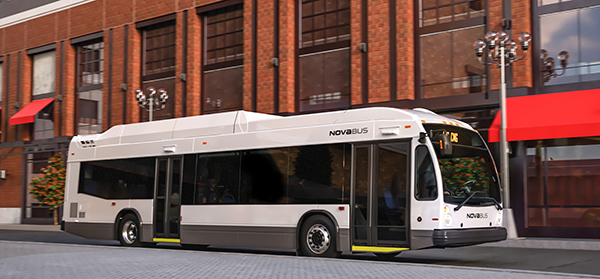Volume 27 | Issue 2
Click here to read the complete illustrated article or continue below to read the text article.
A city’s transportation network is a kind of cardiovascular system through which people flow; increasingly, the heart of that system is a Nova Bus battery electric bus.
Nova Bus is a Canadian manufacturer of environmentally-friendly battery electric buses and intelligent transportation systems. A subsidiary of the Volvo Group based in Saint- Eustache, Quebec, Nova Bus has a long history in public bus manufacturing dating back to its origins in 1979 as a division of General Motors. Fast forward to today’s pressing need for efficient, reliable, and sustainable transit solutions in light of climate change, Nova Bus LFS models are available in different powertrains including hybrid, natural gas, and electric. The company’s ability to help public transportation systems attain their sustainable transit goals are represented by a number of significant contract awards in 2024 for the LFSe+ 40-foot long-range battery electric bus.

Key features of the Nova LFS platform include:
In addition, the LFSe battery electric model offers the most efficient electromobility transit solution:
This May, Nova Bus was awarded a contract for 33 LFSe buses to join the zero emissions fleet of BC Transit in British Columbia and support its bus replacement strategy to all- electric and comply with the province’s greenhouse gas (GHG) reduction targets.
Bow Valley Regional Transit Services (BVRTSC) in Banff, Alberta ordered its first three LFSe buses last April. This order was made possible through the Federal Rural Transit Solutions Fund (RTSF), in addition to another contract for three Nova Bus hybrid electric buses, supported by the Investing in Canada Infrastructure Program (ICIP).
“We are delighted to be introducing Nova Bus LFSe+ battery electric buses into our fleet. As we operate Roam Transit services within and around Banff National Park, environmental stewardship is paramount. Embracing advanced technologies to reduce emissions underscores our commitment to sustainable transit. Adding more electric buses marks a pivotal moment in our transition journey, furthering our partnership with Nova Bus and advancing towards a greener future,” said Martin Bean, CEO of Roam Transit in a public relations announcement of the contract award.
Brampton, Ontario signed a contract in March with Nova Bus for ten LFSe buses scheduled for delivery next year. The acquisition is an important milestone in Brampton’s electrification plans in its efforts to reduce greenhouse gas emissions by 80 percent by 2050, and is in line with the Government of Canada’s goal of achieving net zero emissions by 2050.
In January, Nova Bus was awarded a 5-year contract with Regina, Saskatchewan to deliver up to 53 LFSe buses. The first seven are scheduled for delivery in 2025, with options for the remaining 46. “These will be the first battery-electric buses in Regina Transit’s fleet,” said Brad Bells, Director of Transit & Fleet, in a public relations announcement of the contract. “The addition of these electric buses will support the City of Regina’s goal of becoming a 100% renewable city by 2050 and is in line with our Energy and Sustainability Framework.”
Just as internal combustion engine vehicles displaced the horse and buggy, electric vehicles are beginning to live up to the promise of zero emission transportation. As the market grows for electromobility solutions, Nova Bus is pulling ahead.
Scott Ellyson, CEO of East West Manufacturing, brings decades of global manufacturing and supply chain leadership to the conversation. In this episode, he shares practical insights on scaling operations, navigating complexity, and building resilient manufacturing networks in an increasingly connected world.